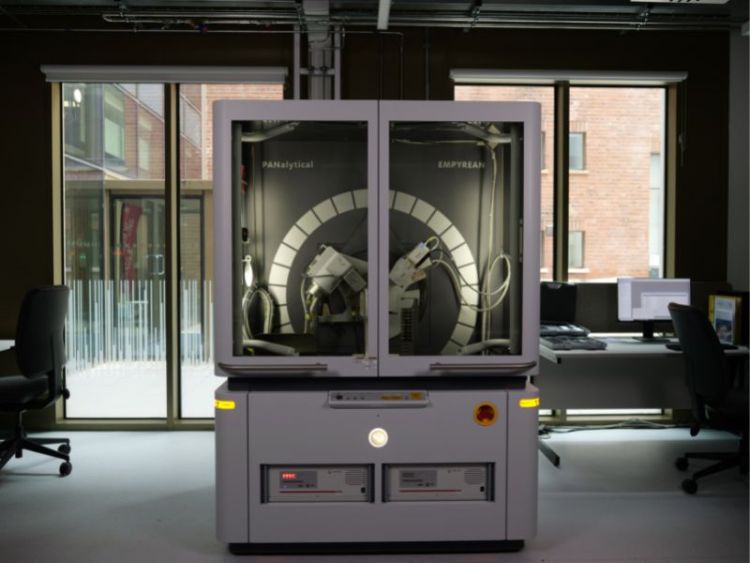X-ray diffraction facility
- Overview: The x-ray diffraction facility is a part of the Bragg Centre for Materials Research.
Located in the fittingly named Bragg Building, after Sir William Henry Bragg and Lawrence Bragg who won the 1915 Nobel Prize for ‘their services in the analysis of crystal structure by means of X-rays’ while Sir William Henry Bragg was a Professor at Leeds between 1909 and 1915. - Contact name: Dr Fanny Costa
- Phone: +44 (0)113 543 1323
- Email: xrd.bragg@leeds.ac.uk

Just as it was the ambition of the Braggs’; accessing, understanding and unlocking atomic structure is the still the aim of our x-ray diffraction facility, over 100 years on.
This allows us to better understand and exploit materials and devices to their full potential. To achieve this, the facility houses a range of x-ray diffractometers as well as a suite of analysis tools to structurally characterise powders, thin films and coating, solid materials, single crystals and devices.
For more information visit the Bragg Centre for Materials Research website or email the Bragg Centre Team.
Our aim is to produce world-class structural analysis on a wide range of materials to improve the understanding of a materials physical and chemical behaviour such as electrical, thermal, magnetic and mechanical properties. By determining the spacing between crystal lattice planes and the length scales over which they persist, we are able to determine the 3D atomic structure of materials.
Specialist technologies
We have several x-ray diffractometers which can be operated in many different modes. All modes reveal different information about the material such as:
- Residual stress analysis - Determine residual stress within the structure to better understand the physical properties
- Texture (preferred orientation) analysis - Study preferential ordering and epitaxial growth of crystallites (such as thin films or single crystals)
- Bragg-Brentano - Phase identification in crystalline and non-crystalline materials as well as quantification of phases within mixtures
- Line broadening - Determination of crystallite size
- Hot and cold stage analysis - To study the effect of different temperatures on the structure and crystalline nature of a material
- Reflectometry – To characterise surfaces, thin films and multilayers
Specialist research areas
- Interfaces/surfaces
- Thin films
- Powders
- Ceramics
- Biomaterials
- Composite materials
- Minerals
- Metallurgy
- Nanomaterials
Equipment
X-ray diffraction equipment
- Empyrean (Malvern PANalytical) for in-situ cutting edge XRD research on thin films, liquids, powders and devices under ambient and non-ambient conditions.
- Compatible with a range of sample mounting and sample types
- Range of modes in reflection and transmission
- 5-axis cradle for glancing angle (GIXRD), pole figures and texture analysis
- Hot stage (Anton Parr HTK 1200) upto 1200°C
- Cold stage (Anton Parr TTK 600) +100°C down to -190°C
- Bruker D8 Diffractometer with full sized goniometer pXRD under ambient conditions.
- Capillary stage holders for transmission
- Solid sample capabilities
- Powder holders
- PANalytical Aeris Benchtop XRD for high-throughput.
- 6 sample changer
- high-quality phase identification and quantification
Analysis suite
- All-in-one HighScore software suite
- For phase identification, quantification, profile fitting.
- TOPAS Academic v.7
- Profile fitting based software for quantitative phase analysis, microstructural analysis and structural analysis of Bragg and PDF data.
- Access to annually updated ICDD database
- Comprehensive Powder Diffraction File database with more than 1,104,100 entries (organic and inorganic) for phase identification needs.
- X’pert Texture
- Designated to analyse, calculate and visualise preferred crystallite orientations.
Who can use the facility?
If you require X-ray diffraction analysis we can advise on the most appropriate modes of operation for your needs, and at the right cost.
We have highly trained and qualified personnel with the necessary experience to provide high quality, friendly and comprehensive service to both academic and industrial users.
To discuss your requirements please contact: Dr Fanny Costa, Head of X-ray Analytical Facilities, by calling +44(0)113 543 1323, or emailing f.nascimentocosta@leeds.ac.uk.

